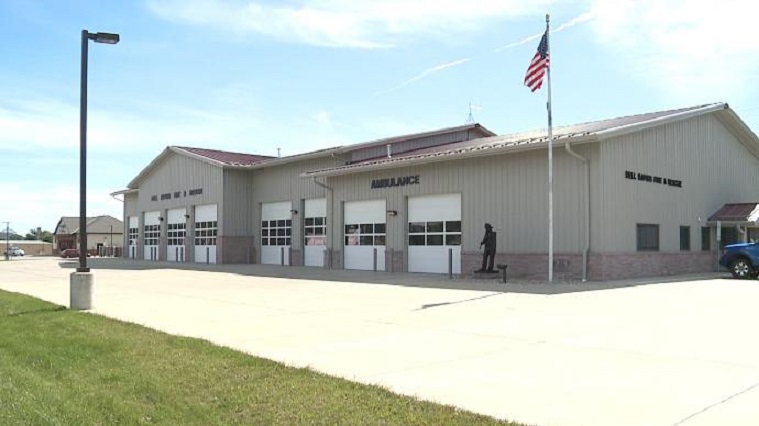Why did DC 911 take almost 14 minutes to dispatch fire & EMS to a Metrorail emergency?
The latest in a long series of failures sending timely help to rail emergencies in DC
Looking for a quality used fire truck? Selling one? Visit our sponsor Command Fire Apparatus
With more than 100 passengers stranded on a decoupled Metro train Friday, DC’s 911 center waited almost 14-minutes to send help. This lengthy delay fits a pattern. DC’s Office of Unified Communications (OUC) has long had difficulty promptly sending help to Metrorail emergencies. The problem is so bad federal investigators recommended an outside audit of DC 911 operations following a deadly Metro fire more than five years ago. City officials failed to follow that recommendation, yet the problems continue.
The separated train
Metro says it called DC 911 requesting fire and EMS to the Red Line north of Union Station within two minutes of learning the train had uncoupled. A Metro spokesperson confirms that call was made from its Rail Operations Control Center (ROCC) at 12:22 pm. According to radio traffic logged by OpenMHz.com (above), fire and EMS wasn’t dispatched until 12:36 pm. The time is further verified on the recording by the dispatcher’s time check of “12:37” that came at the end of the lengthy dispatch that sent fire and EMS to two adjacent Metro stations. The obvious question is why did OUC wait approximately 14-minutes before dispatching fire and EMS to this rail emergency?
We’ve asked for that answer from an OUC spokesperson. So far, that request — along with dozens of others from STATter911 over the past year — has not even been acknowledged.

Once they arrived, DC Fire & EMS helped direct the evacuation of the stranded passengers from the two sections of the separated train. Two of the passengers were evaluated by EMS at the scene.
Delays & confusion during rail emergencies
There’s a long history of OUC failing to promptly and accurately dispatch DC Fire & EMS to Metrorail emergencies. In many of the incidents, delay and confusion were also caused by Metro’s ROCC. One year — almost to the day — before Friday’s incident, the combination of ROCC and OUC led to miscommunication and a lengthy delay dispatching fire and EMS to the collision of two trains at the Farragut West Metro Station. Radio traffic from the October 7, 2019 incident showed that 18-minutes after the collision OUC was still unclear where in the Metro system the crash occurred.
Four days after the 2019 collision, reporter Paul Wagner attempted to get a response from DC Mayor Muriel Bowser about OUC’s dispatch delay (below). Wagner was told by Mayor Bowser, “I will respond to that at another time.” That response never came and there has been no investigation or public accountability about OUC’s role in the collision.
On Metro’s end, the Washington Metrorail Safety Commission (WMSC) investigated ROCC’s actions during the Farragut West collision and made recommendations. You can read the report here. In the last year, WMSC has been very critical of ROCC’s operations during a series of emergency incidents. Until very recently, the DC government has failed to provide similar oversight of DC’s 911 center. Three weeks ago, DC Auditor Kathy Patterson announced an audit of OUC to begin early next year.
Ignoring the problem
City officials have long ignored OUC’s repeated failures in handling rail emergencies. During the deadly January 12, 2015 fire in a tunnel at the L’Enfant Plaza Metro Station, ROCC and OUC missteps delayed the dispatch of DC Fire & EMS for almost 20-minutes. While waiting for fire and EMS to arrive, passenger Carol Glover died and scores of others suffered smoke inhalation.
Following the L’Enfant Plaza fire, the National Transportation Safety Board (NTSB) recommended an “independent outside audit” of OUC’s emergency call processing. DC officials refused to follow NTSB’s recommendation. The audit was never performed. DC Council member Charles Allen, who is responsible for OUC oversight, told reporter Sloane Airey in January that he has “no position” on the audit.

Despite Allen’s lack of interest in the NTSB report, the Office of the DC Auditor listed the failure to follow the federal investigative agency’s recommendation as one reason for its audit.
Where’s the outrage?
During the five years of Mayor Bowser’s administration, OUC delayed dispatching and caused confusion during numerous other Metro incidents. Despite this continuing issue and the L’Enfant Plaza tragedy, Bowser’s administration and the DC Council won’t even acknowledge that one of OUC’s many problems is accurately and promptly dispatching DC Fire & EMS to rail emergencies.
While DC officials ignore the problem, the pattern is clear and the danger from these failures is real. When will “another time” — as mentioned by Mayor Bowser a year ago — finally come? When will Bowser finally provide details and answers about numerous serious incidents at OUC? When will Council member Allen finally demand transparency and accountability? When will someone in charge finally say out loud, “A 14-minute dispatch time is shameful and this problem must be fixed immediately”?





